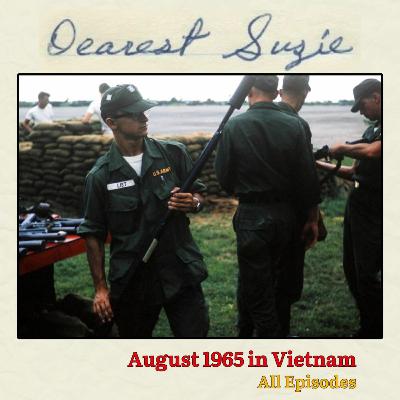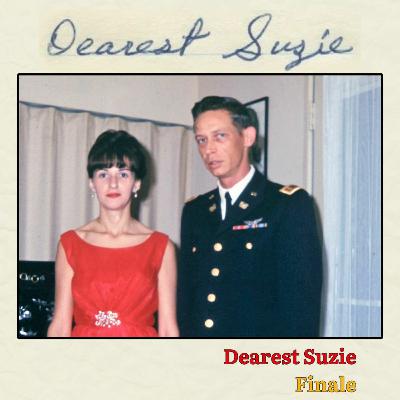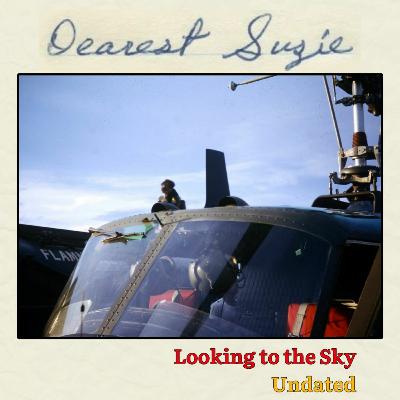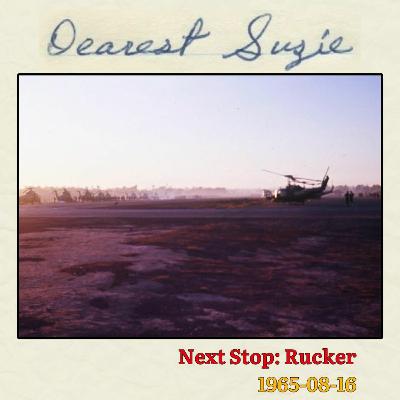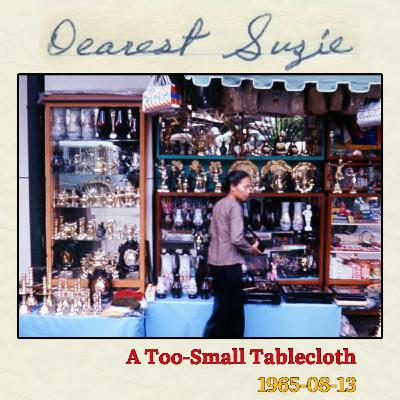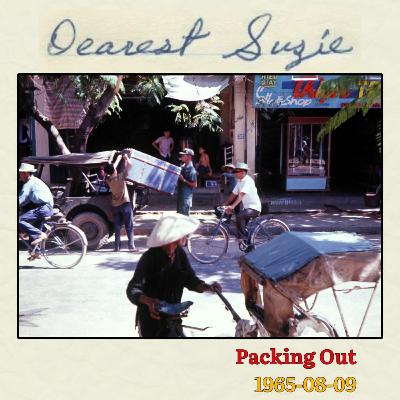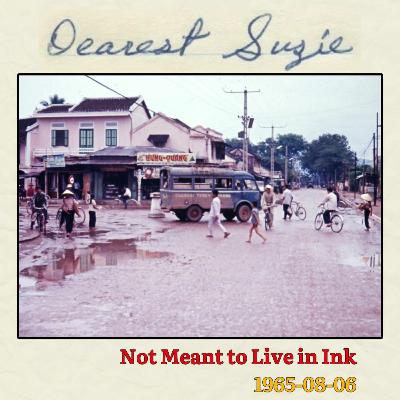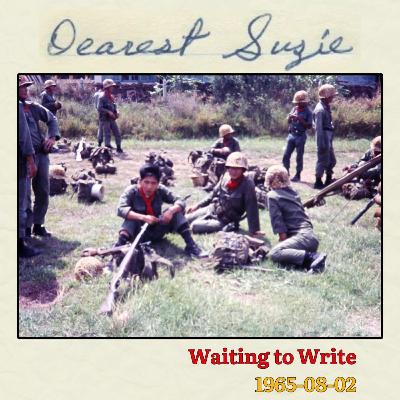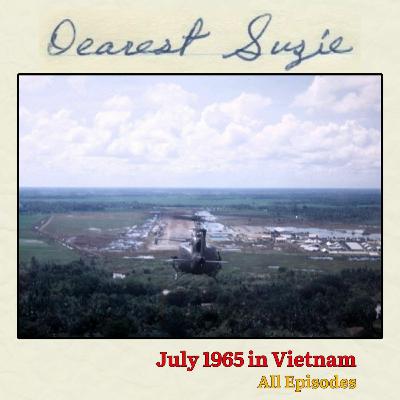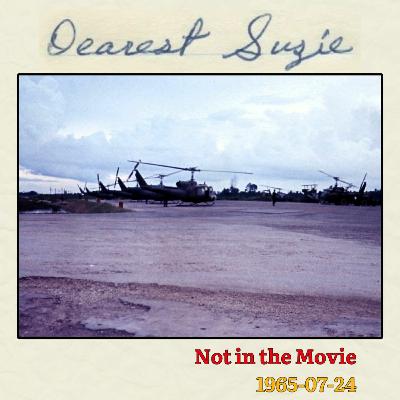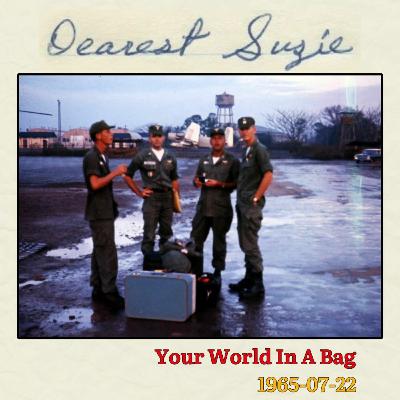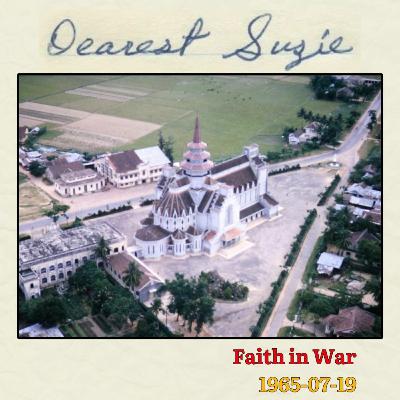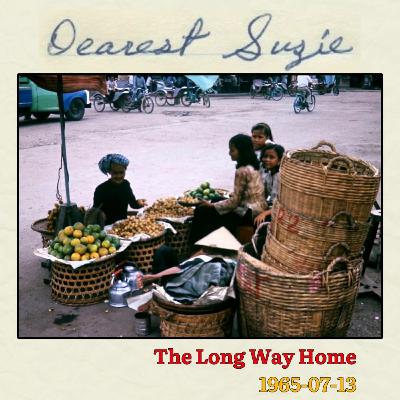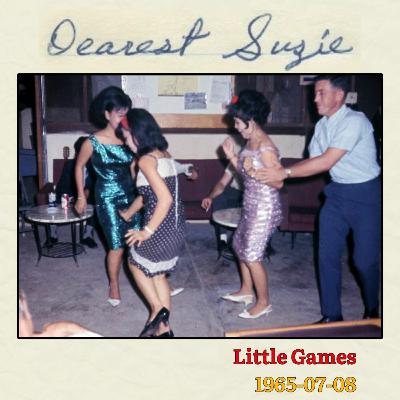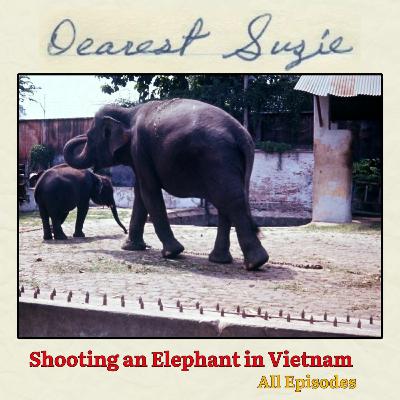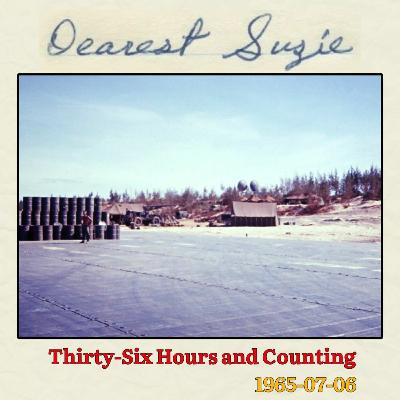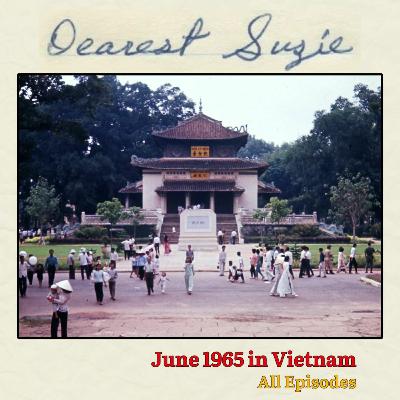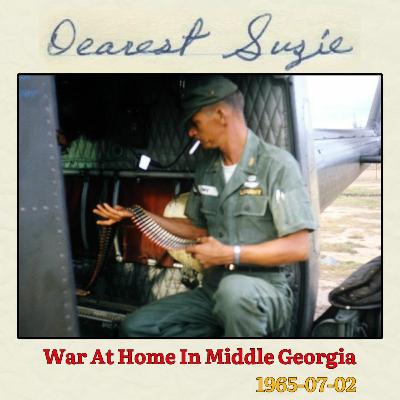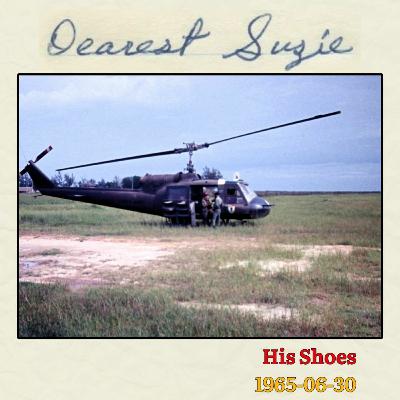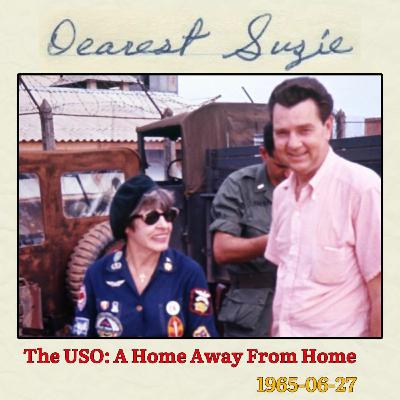Discover Dearest Suzie
Dearest Suzie

 Dearest Suzie
Dearest Suzie
Author: Alexander Lowie
Subscribed: 4Played: 37Subscribe
Share
© 2025 Dr. Alexander Lowie
Description
Welcome to Dearest Suzie, a podcast and photo series that brings to life the personal letters, diary entries, and photographs of U.S. Army helicopter pilot William “Bill” Lowie during his service in the Vietnam War. In this introductory episode, host Alexander Lowie—Bill’s grandson and an anthropologist—sets the stage for a journey through family history and wartime memories.
With the 60th anniversary of the Vietnam War approaching, Alexander will share Bill’s experiences in a unique “on this day in history” format, pairing each diary entry or letter with a corresponding photograph. These materials offer a deeply personal glimpse into the war, with over 100 letters to his wife, Susan (“Suzie”), and more than 500 photos captured during his deployment.
More than just a historical archive, Dearest Suzie is about discovery, reflection, and connection. Whether you’re interested in military history, personal stories, or exploring your own family’s past, this podcast encourages you to listen, learn, and share your own stories. Join us as we uncover Bill’s memories, one letter at a time.
With the 60th anniversary of the Vietnam War approaching, Alexander will share Bill’s experiences in a unique “on this day in history” format, pairing each diary entry or letter with a corresponding photograph. These materials offer a deeply personal glimpse into the war, with over 100 letters to his wife, Susan (“Suzie”), and more than 500 photos captured during his deployment.
More than just a historical archive, Dearest Suzie is about discovery, reflection, and connection. Whether you’re interested in military history, personal stories, or exploring your own family’s past, this podcast encourages you to listen, learn, and share your own stories. Join us as we uncover Bill’s memories, one letter at a time.
138 Episodes
Reverse
In this episode of Dearest Suzie, we reach the final stretch of Popi’s tour. August 1965 was a month of counting days, packing bags, and fighting nerves. Stationed in Da Nang, Popi spent most of the month in limbo, flying only a handful of missions while waiting on official word of his return home. His letters are full of restlessness, doubt, and fatigue, but also humor, tenderness, and hope. He checks on Suzie, gives instructions for back pay and savings bonds, and dreams aloud about being a husband and father again.
Popi's voice shifts this month. His tone softens. The war becomes more memory than menace, and his words begin to reach not just across the Pacific, but into the future. At one point, he tells Suzie he’ll probably never be able to explain what it was like in Vietnam. In a way, that’s what the letters have done for him, and for all of us. This episode marks the final entry in his year of writing from Vietnam. Additionally, I write my own letters, reflecting on my time working on this project and my visit to see Popi, at the Florida National Cemetery. I end the show with my own letter to Suzie, better known as Mema.
Follow Dearest Suzie on social media:
YouTube: https://www.youtube.com/channel/UC1GwqPyO061k0iaQRKwfjoQ
Instagram: https://www.instagram.com/dearestsuziepodcast/
X: https://x.com/DearestSuziePod
TikTok: https://www.tiktok.com/@dearestsuziepodcast
📧 Have a story to share or want to reach out? Email me at dearestsuziepodcast@gmail.com
— I’d love to hear from you!
VietnamWar #LettersHome #DaNang1965 #InheritTheStories #HelicopterPilot #VietnamLetters #MilitaryHistory #FamilyHistory #DearestSuzie #MemoryAndMyth #FinalTour #ComingHome #August1965 #CountdownToHome
In this episode of Dearest Suzie, I write not just about Popi’s time in Vietnam, but about everything that’s come after. Sixty years after his letters home, I’m the same age he was in 1965 and I took the time to write him a letter of my own, describing my experiences working on this show. This isn’t a scripted history lesson or a dramatic retelling, it’s a conversation across time. I share what life’s been like since he passed, how much he’s missed, what I’ve learned from his words, and what it meant to help his voice live on through this podcast.
Alongside that, I reflect on the meaning of legacy, family, and memory. I visit Popi’s grave at Florida National Cemetery, explore some newly uncovered VHS tapes from the 1980s, and speak directly to Mema, whose voice and resilience shaped every part of this story. This episode marks the end of Dearest Suzie, but it’s not a goodbye. It’s a "Thank You." For listening, for remembering, and for keeping the love alive. Thank you for allowing me to inherit this story.
What’s Covered:
- A letter to Popi, 60 years after his own
- Visiting Florida National Cemetery
- The meaning behind coins on military graves
- Unearthed VHS tapes and old family footage
- A letter to Mema, and her fight against cancer
- Reflections on war, legacy, faith, and family
📷 Featured Photo: A photo of Mema and Popi decades ago, dressed for a military ball.
🔔 If you enjoyed this episode, please consider sharing the show with a friend or loved one.
Follow Dearest Suzie on social media:
YouTube: https://www.youtube.com/channel/UC1GwqPyO061k0iaQRKwfjoQ
Instagram: https://www.instagram.com/dearestsuziepodcast/
X: https://x.com/DearestSuziePod
TikTok: https://www.tiktok.com/@dearestsuziepodcast
📧 Have a story to share or want to reach out? Email me at dearestsuziepodcast@gmail.com — I’d love to hear from you!
VietnamWar #LettersHome #FamilyHistory #OralHistory #InheritTheStories #FloridaNationalCemetery #MilitaryGraves #Legacy #Veterans #VietnamPodcast #Cardinals #MemoryAndMyth #DearestSuzie #Mema #Popi
In this episode of Dearest Suzie, Popi writes an undated letter from Vietnam. Charlie, his mischievous monkey, has finally been locked up after stealing candy from a care package. His cage now sits just outside Popi’s hootch, becoming a regular attraction on base. But even this lighthearted story carries weight, about control, comfort, and how we try to make chaos manageable. The letter shifts unexpectedly when Popi recounts a serious cyclo accident that left his friend, Burke Badgett, unconscious and badly injured. The crash wasn’t war-related, just a freak moment—and yet it rattled Popi deeply. He thought Burke might be dead.
This episode explores the unexpected dangers and quiet loneliness of war. Not every scare comes from battle. Some come from chance. Some from distance. And some from the aching quiet after looking at photos of the people you love. Popi ends this letter not with drama, but with honesty, missing home so much it hurts, learning just how deep his love for Suzie and the boys has grown over the last eight years.
What’s Covered:
- Charlie’s candy theft and new cage placement
- The unplanned violence of a cyclo accident in town
- Burke Badgett’s injuries and Popi’s fear he had died
- The emotional weight of distance and memory
- How writing letters became a lifeline through loneliness
📷 Featured Photo: Charlie the monkey, perched confidently atop a helicopter, staring into the distance. Popi captured the moment, a symbol of mischief, companionship, and forward-looking hope, two copilots, both looking to the sky.
🔔 If you enjoyed this episode, don’t forget to like, share, and subscribe!
Follow Dearest Suzie on social media:
YouTube: https://www.youtube.com/channel/UC1GwqPyO061k0iaQRKwfjoQ
Instagram: https://www.instagram.com/dearestsuziepodcast/
X: https://x.com/DearestSuziePod
TikTok: https://www.tiktok.com/@dearestsuziepodcast
📧 Have a story to share or want to reach out? Email me at dearestsuziepodcast@gmail.com — I’d love to hear from you!
VietnamWar #HueyHelicopter #CharlieTheMonkey #MilitaryHistory #WarLetters #InheritTheStories #FamilyHistory #OralHistory #LookingToTheSky
In this episode of Dearest Suzie, Popi writes on August 16, 1965. His orders still haven’t come through, but the destination is set: Fort Rucker, Alabama. He’s already packed, ready to ship his belongings, and growing restless as the end of his tour draws closer. Though he isn’t thrilled about the post, he admits there are worse places, and at least they won’t have to move far. He jokes with Suzie about her surviving one more month with three kids, and signs off with the hope that she’ll be happy with the news.
This episode dives into the legacy of Fort Rucker, the home of Army aviation. During the Vietnam War, tens of thousands of helicopter pilots trained there, including Popi. The post became the proving ground for a new kind of warfare; airmobile, fast-moving, and flexible. From training on the UH-1 Huey to perfecting nap-of-the-earth flight, Fort Rucker shaped the strategy that defined the American war effort in Southeast Asia.
What’s Covered:
- Popi’s update from Vinh Long and news of his next post
- The evolution of Fort Rucker into the Army Aviation Center
- How helicopter warfare transformed military tactics during Vietnam
- The role of training in adapting to a new kind of combat
- Reflections on this being the final letter in the chronological collection
📷 Featured Photo: A dreamlike shot of an early morning flight line—helicopters and planes parked on the tarmac as the sun rises. Some men walk in the distance. Perhaps this was the kind of view Popi saw on one of his final mornings in-country.
🔔 If you enjoyed this episode, don’t forget to like, share, and subscribe! I’ll be posting new episodes regularly, sharing letters and stories from exactly 60 years ago, as written by my grandfather.
Follow Dearest Suzie on social media:
YouTube: https://www.youtube.com/channel/UC1GwqPyO061k0iaQRKwfjoQ
Instagram: https://www.instagram.com/dearestsuziepodcast/
X: https://x.com/DearestSuziePod
TikTok: https://www.tiktok.com/@dearestsuziepodcast
📧 Have a story to share or want to reach out? Email me at dearestsuziepodcast@gmail.com — I’d love to hear from you!
VietnamWar #FortRucker #ArmyAviation #HelicopterPilot #MilitaryHistory #WarLetters #InheritTheStories #FamilyHistory #OralHistory
In this episode of Dearest Suzie, Popi writes on August 13, 1965, from a villa in Saigon. He’s groggy, hungry, and still waiting on the orders that will send him home. But in between complaints about raunchy coffee and missing breakfast, there’s something else stirring: thoughtfulness. With only weeks left in-country, he’s begun souvenir shopping, jewelry boxes for the grandmothers, cloth for his sisters, a uniform for Al. He even buys a tablecloth from a group of Irish Catholic nuns, fully aware it won’t fit any table they own. “I just call it my contribution to the war effort,” he jokes.
This episode explores the quiet acts of care that soldiers engage in at the end of a long deployment. From a conversation over raisin cake with nuns raising money for an orphanage, to his quip that Suzie will only receive about fifteen more letters, Popi is beginning to shift. He’s thinking not just about going home, but about what he’s bringing back with him—and what kind of man he wants to be when he gets there. That too-small tablecloth becomes a kind of symbol: proof that generosity can persist, even amid exhaustion, even when it doesn’t quite fit.
What’s Covered:
- Bill’s R&R in Saigon and frustration with delayed orders
- His visits with Irish Catholic nuns raising money for an orphanage
- Souvenir shopping as a ritual of return
- Quiet reflections on nearing the end of a year-long deployment
📷 Featured Photo: A woman stands in the foreground of a storefront display filled with candle holders, porcelain vases, and mother-of-pearl jewelry boxes—just like the ones Mema kept for decades.
🔔 If you enjoyed this episode, don’t forget to like, share, and subscribe! I’ll be posting new episodes regularly, sharing letters and stories from exactly 60 years ago, as written by my grandfather.
Follow Dearest Suzie on social media:
YouTube: https://www.youtube.com/channel/UC1GwqPyO061k0iaQRKwfjoQ
Instagram: https://www.instagram.com/dearestsuziepodcast/
X: https://x.com/DearestSuziePod
TikTok: https://www.tiktok.com/@dearestsuziepodcast
📧 Have a story to share or want to reach out? Email me at dearestsuziepodcast@gmail.com — I’d love to hear from you!
VietnamWar #SouvenirsOfWar #IrishNuns #SaigonStories #MilitaryHistory #WarLetters #InheritTheStories #DearestSuzie #FamilyHistory #OralHistory
In this episode of Dearest Suzie, Popi writes on August 9, 1965, just after returning to Vinh Long. It’s his final stop before heading home, and the tone of the letter reflects that shift, lighter, focused, and filled with anticipation. He’s back at his own desk, finally able to write with ease. His first priority? Packing. He describes buying a large trunk in Quang Ngai and quickly realizing it’s not big enough to hold all he’s accumulated during his year in Vietnam. From gear to gifts, every item tells a story, and he plans to lock the trunk with two padlocks, saving its contents for Suzie’s eyes alone.
This episode explores the quiet ritual of “packing out,” a tradition that stretches back through generations of American soldiers. Trunks carried more than objects, they carried closure. As Popi prepares to send his belongings home ahead of him, he’s also trying to shape how that return will feel. He’s not just coming back with things, he’s coming back with stories, tokens of love, and a hope that these small gestures will bridge the long absence. Even Charlie, his mischievous monkey, gets a mention, having caused trouble while Popi was gone. It’s a letter about transition, memory, and the delicate process of returning to a life you never really left behind.
What’s Covered:
- Bill’s reflections on returning to Vinh Long and beginning the process of packing up
- The history and meaning of “packing out” across different wars
- How souvenirs become emotional touchstones of a soldier’s service
- The small, personal ways Popi tried to prepare for homecoming
📷 Featured Photo: A bustling Vietnamese street. In the center, Popi—cigarette in mouth—helps load a large blue trunk onto the back of a jeep. A moment of quiet logistics, perhaps the very trunk he hopes to open at home with Suzie by his side.
🔔 If you enjoyed this episode, don’t forget to like, share, and subscribe! I’ll be posting new episodes regularly, sharing letters and stories from exactly 60 years ago, as written by my grandfather.
Follow Dearest Suzie on social media:
YouTube: https://www.youtube.com/channel/UC1GwqPyO061k0iaQRKwfjoQ
Instagram: https://www.instagram.com/dearestsuziepodcast/
X: https://x.com/DearestSuziePod
TikTok: https://www.tiktok.com/@dearestsuziepodcast
📧 Have a story to share or want to reach out? Email me at dearestsuziepodcast@gmail.com — I’d love to hear from you!
VietnamWar #LettersHome #PackingOut #VietnamHistory #MilitaryHistory #WarLetters #InheritTheStories #DearestSuzie #FamilyHistory #OralHistory
In this episode of Dearest Suzie, Popi writes on August 6, 1965, just two days before he’s set to return to Vinh Long. His mission up north, “a mess” as he calls it, is finally over, and with less than two months left in Vietnam, his thoughts are turning homeward. He shares a small victory: tired of waiting for supplies, he buys a Vietnamese four-color pen in town. He wonders where Suzie is, whether she’s safely back in Florida, and whether Brian still asks about his “old man.” There’s a tenderness in his questions, a softness that’s only grown stronger the closer he gets to home.
This episode reflects on the quiet space between action and return. Popi writes shorter letters now, saving stories for when he can tell them in person, stories he never ends up sharing. The pen becomes a symbol of that tension: his need to write, his reluctance to relive, and the knowledge that some memories can’t, or shouldn’t, be captured in ink. In the background, war still looms, but for Popi, the countdown has begun, and the ache of distance now carries the shape of home.
What’s Covered:
- Bill’s letter from August 6, written in four different ink colors
- Reflections on the everyday details that mark the end of a long deployment
- The emotional weight of unsent stories and memories left unspoken
- A grandson’s reflection on what gets remembered and what doesn’t
📷 Featured Photo: A street scene in a Vietnamese town. Bicycles, puddles, shop signs, and a barefoot child fill the frame. Perhaps this was the corner where Popi found his pen.
🔔 If you enjoyed this episode, don’t forget to like, share, and subscribe! I’ll be posting new episodes regularly, sharing letters and stories from exactly 60 years ago, as written by my grandfather.
Follow Dearest Suzie on social media:
YouTube: https://www.youtube.com/channel/UC1GwqPyO061k0iaQRKwfjoQ
Instagram: https://www.instagram.com/dearestsuziepodcast/
X: https://x.com/DearestSuziePod
TikTok: https://www.tiktok.com/@dearestsuziepodcast
📧 Have a story to share or want to reach out? Email me at dearestsuziepodcast@gmail.com — I’d love to hear from you!
VietnamWar #LettersHome #FourColorPen #VietnamHistory #MilitaryHistory #WarLetters #InheritTheStories #DearestSuzie #FamilyHistory #OralHistory
In this episode of Dearest Suzie, Popi writes on August 2, 1965. He’s still stuck in limbo without orders, unsure where to send his letters, New Jersey or Florida, and frustrated by the instability of his temporary base. Writing with a pencil instead of his usual pen, he reflects on how hard it’s been to write while on the move. With less than two months left, he’s counting down the days and thinking constantly of home.
This episode captures the growing restlessness among soldiers like Popi as the war expands around them. In August 1965, the United States launched its first all-American offensive, Operation Starlite, while CBS broadcast footage of Marines bulldozing a village—offering Americans a new, unfiltered view of the war. Chinese leaders issued threats, SAM missiles took out U.S. aircraft, and the Selective Service removed exemptions for married men. The war was changing fast, and the pressure was mounting from all sides. Amid it all, Popi just wanted to get back to Vinh Long, write from his own desk again, and begin the journey home.
What’s Covered:
- Bill’s frustration over delayed orders and trouble writing from the field
- The broadcast that shocked America: CBS films the destruction of Cam Ne
- Operation Starlite and the growing complexity of combat
- Shifting draft policies and the expanding reach of the war
📷 Featured Photo: ARVN troops relax at a training range, red bandanas tied around their necks, helmets resting nearby, with sandbags stacked behind them. A quiet moment of calm before war resumed its pace.
🔔 If you enjoyed this episode, don’t forget to like, share, and subscribe! I’ll be posting new episodes regularly, sharing letters and stories from exactly 60 years ago, as written by my grandfather.
Follow Dearest Suzie on social media:
YouTube: https://www.youtube.com/channel/UC1GwqPyO061k0iaQRKwfjoQ
Instagram: https://www.instagram.com/dearestsuziepodcast/
X: https://x.com/DearestSuziePod
TikTok: https://www.tiktok.com/@dearestsuziepodcast
📧 Have a story to share or want to reach out? Email me at dearestsuziepodcast@gmail.com — I’d love to hear from you!
VietnamWar #CamNe #OperationStarlite #MilitaryHistory #WarLetters #InheritTheStories #DearestSuzie #FamilyHistory #OralHistory
In this compilation episode of Dearest Suzie, we revisit the letters of July 1965—a month of unbearable heat, long missions, and mounting exhaustion as Popi enters the final stretch of his tour. Stationed between Da Nang and Quang Ngai, he writes of 36-hour shifts, bad food, absent mail, and growing uncertainty about where he’ll be sent next. Amid the routine, he dreams of home, R&R, and board games with Suzie, even as a Viet Cong sapper attack and the arrival of the 1st Air Cavalry remind him that nothing is guaranteed.
But July isn’t just about what happened in-country. This episode moves between 1965 and decades later, when a Fourth of July evening in Georgia stirs memories Popi thought he’d left behind. From monkey troubles and heatstroke to reflections on faith and trauma, these letters reveal the quiet toll of war on both sides of the world—and the ways Popi kept loving, writing, and holding on.
🔔 If you enjoyed this episode, don’t forget to like, share, and subscribe! I’ll be posting new episodes regularly, sharing letters and stories from exactly 60 years ago, as written by my grandfather.
Follow Dearest Suzie on social media:
YouTube: https://www.youtube.com/channel/UC1GwqPyO061k0iaQRKwfjoQ
Instagram: https://www.instagram.com/dearestsuziepodcast/
X: https://x.com/DearestSuziePod
TikTok: https://www.tiktok.com/@dearestsuziepodcast
📧 Have a story to share or want to reach out? Email me at dearestsuziepodcast@gmail.com — I’d love to hear from you!
VietnamWar #WarLetters #MilitaryHistory #DearestSuzie #BillLowieLetters #InheritTheStories #FamilyHistory #July1965 #VietnamVeterans #MemoryAndMyth #HelicopterPilot #AirCav #Flashbacks #TraumaAndService #QuangNgai #DaNang #Homefront #WarAndFaith #PTSD #VietnamHomecomings
In this episode of Dearest Suzie, Popi writes on July 24, 1965, during a rare day off. He’s not sure where Suzie is, in Florida or still in New Jersey, so he’s sending his letters home and hoping they find her. There’s still no word on his orders, but he’s hoping to leave Quang Ngai by August 8. The delay matters not just for him, but for Charlie, the monkey he hopes to send home before the weather turns cold. Popi also mentions a big change: the 11th Air Assault Division is coming to Vietnam, newly renamed the 1st Air Cavalry Division.
This episode explores the arrival of the 1st Air Cav and how it transformed the war. Built from the 11th Air Assault Division, the 1st Cavalry was the first full-scale airmobile force. Its rapid deployment in July 1965 marked a turning point. With helicopters at its core, the unit brought unprecedented speed and reach to combat, but also new risks. Their first major test came at Ia Drang, a brutal battle that revealed both the strengths and limits of air mobility. For soldiers like Popi, their arrival signaled a shift: the war was changing, growing, and coming closer to what aviation crews had already been living through.
What’s Covered:
- Bill’s reflections on Suzie’s travel, his day off, and hopes to return to Vinh Long
- The arrival of the 1st Air Cavalry Division and the airmobile revolution
- The Battle of Ia Drang and its impact on U.S. strategy in Vietnam
- Family myths about military service and why we cling to them
📷 Featured Photo: A row of Huey helicopters lined up on a worn tarmac, the pavement pitted and scarred. Each chopper bears the white star of the U.S. Army—ready to move, ready to fight.
🔔 If you enjoyed this episode, don’t forget to like, share, and subscribe! I’ll be posting new episodes regularly, sharing letters and stories from exactly 60 years ago, as written by my grandfather.
Follow Dearest Suzie on social media:
YouTube: https://www.youtube.com/channel/UC1GwqPyO061k0iaQRKwfjoQ
Instagram: https://www.instagram.com/dearestsuziepodcast/
X: https://x.com/DearestSuziePod
TikTok: https://www.tiktok.com/@dearestsuziepodcast
📧 Have a story to share or want to reach out? Email me at dearestsuziepodcast@gmail.com — I’d love to hear from you!
VietnamWar #1stAirCavalry #IaDrang #MilitaryHistory #WarLetters #InheritTheStories #DearestSuzie #FamilyHistory #OralHistory
In this episode of Dearest Suzie, Popi writes on July 22, 1965. He’s still living out of a duffle bag, waiting for orders, and counting down the days—just 62 left in-country. Suzie’s letter has arrived, and he’s glad to hear she’s enjoying her vacation despite everything. Things have been quiet for the moment but there’s a big operation planned for the next morning. The uncertainty is wearing thin, but he’s keeping his sense of humor.
This episode explores the duffle bag as more than just gear—it was a soldier’s portable world. From Civil War haversacks to the barrel-style bags of Vietnam, military packs have long carried not just equipment but connection: letters, photos, comforts from home. For Popi, that bag was home base. With most of his belongings already on their way back to the States, the duffle held what mattered: toothbrush, socks, and letters from Suzie.
What’s Covered:
- Popi’s reflections on living out of a bag and counting down to home
- The military history of duffle bags and what soldiers carried
- How small items became emotional lifelines for deployed troops
- What the duffle bag reveals about mobility, survival, and memory in wartime
📷 Featured Photo: Popi stands with three friends on a wet tarmac, bags between them. The location is uncertain—possibly stateside—but the moment is clear: they’re about to move.
🔔 If you enjoyed this episode, don’t forget to like, share, and subscribe! I’ll be posting new episodes regularly, sharing letters and stories from exactly 60 years ago, as written by my grandfather.
Follow Dearest Suzie on social media:
YouTube: https://www.youtube.com/channel/UC1GwqPyO061k0iaQRKwfjoQ
Instagram: https://www.instagram.com/dearestsuziepodcast/
X: https://x.com/DearestSuziePod
TikTok: https://www.tiktok.com/@dearestsuziepodcast
📧 Have a story to share or want to reach out? Email me at dearestsuziepodcast@gmail.com — I’d love to hear from you!
VietnamWar #DuffleBagHistory #SoldierLife #MilitaryHistory #WarLetters #InheritTheStories #DearestSuzie #FamilyHistory #OralHistory
In this episode of Dearest Suzie, Popi writes on July 19, 1965. The Viet Cong have been active, and he’s running on little rest. He’s relieved to hear Suzie is feeling better and jokes about the boys going to Baptist Bible school, a light moment that reflects the mix of his Southern Baptist background and Suzie’s Northern, Catholic roots. With 60 days left, he’s still waiting on official orders, and rumors are swirling about the 11th Air Assault Division.
This episode explores the quiet presence of faith during the war. At Vinh Long, Irish Catholic nuns ran an orphanage and school despite constant danger. Religious communities like theirs supported both locals and soldiers. For many troops, faith was a personal anchor. Chaplains offered guidance, while church groups back home kept families connected through prayer and care packages. Mema is Catholic, Popi was Baptist, and their marriage bridged that cultural divide. His teasing comment about Bible school is playful but also reveals how faith, like love, endured across distance.
What’s Covered:
- Bill’s reflections on Suzie’s health, Bible school, and 60 days left in-country
- The role of Catholic nuns and chaplains during the Vietnam War
- How faith sustained both soldiers and their families during wartime
- Cultural differences in religious tradition and how they shaped Popi and Suzie’s relationship
📷 Featured Photo: An aerial shot of a large church or cathedral—possibly the same building that appears in Popi’s other photos under construction. A quiet reminder of the spiritual architecture that stood amid the ruins of war.
🔔 If you enjoyed this episode, don’t forget to like, share, and subscribe! I’ll be posting new episodes regularly, sharing letters and stories from exactly 60 years ago, as written by my grandfather.
Follow Dearest Suzie on social media:
YouTube: https://www.youtube.com/channel/UC1GwqPyO061k0iaQRKwfjoQ
Instagram: https://www.instagram.com/dearestsuziepodcast/
X: https://x.com/DearestSuziePod
TikTok: https://www.tiktok.com/@dearestsuziepodcast
📧 Have a story to share or want to reach out? Email me at dearestsuziepodcast@gmail.com — I’d love to hear from you!
VietnamWar #FaithInWar #Chaplains #CatholicNuns #MilitaryHistory #WarLetters #InheritTheStories #DearestSuzie #FamilyHistory #OralHistory
In this episode of Dearest Suzie, Bill writes from Quang Ngai on July 13, 1965, reflecting on the grind of daily missions and the long shadow of homecoming. He’s finally received mail and it comes as a massive relief. He’s been worried about Suzie's health and the boys and he’s already thinking ahead to a real vacation together. He still has no official orders and there are rumors about the dissolution of the 11th as well as delayed paperwork which leaves him in limbo. Still, he marks a date: September 27. If nothing else changes, that’s the day he’ll walk back through the front door.
Today’s episode explores what “going home” really meant for soldiers in Vietnam. The process wasn’t simple. It revolved around a number, DEROS, or Date Eligible for Return from Overseas, which governed when a soldier could leave the war behind. Once a man got “short,” everything shifted. He wasn’t just a soldier anymore, he was a countdown. That sense of being nearly done came with both hope and danger. Unlike earlier wars, Vietnam operated on an individual rotation system, meaning Bill wouldn’t go home with his unit. He’d likely be replaced by someone just arriving, and if time allowed, he’d pass on what he could. After orders came, the journey out involved transit stops in places like Okinawa or Guam, health checks, and long flights to bases like Travis AFB in California or Fort Benning in Georgia. What waited there was paperwork, maybe discharge, and often, emotional whiplash. Because reentry wasn’t easy. Some returned to warm reunions. Others found themselves disoriented by silence, grocery stores, and a country ready to move on.
What’s Covered:
- Popi’s letter about home, health, and the hope of a September return
- How DEROS and the “short-timer” mentality shaped soldier experiences
- The logistics of coming home: orders, layovers, base transitions, and out-processing
- The emotional weight of returning to a country that didn’t always welcome them back
📷 Featured Photo: Little girls buy produce from an older woman on the street—a quiet moment of everyday life that may have reminded Popi of home, and the simple connections that wove his two worlds together.
🔔 If you enjoyed this episode, don’t forget to like, share, and subscribe! I’ll be posting new episodes regularly, sharing letters and stories from exactly 60 years ago, as written by my grandfather.
Follow Dearest Suzie on social media:
YouTube: https://www.youtube.com/channel/UC1GwqPyO061k0iaQRKwfjoQ
Instagram: https://www.instagram.com/dearestsuziepodcast/
X: https://x.com/DearestSuziePod
TikTok: https://www.tiktok.com/@dearestsuziepodcast
📧 Have a story to share or want to reach out? Email me at dearestsuziepodcast@gmail.com — I’d love to hear from you!
VietnamWar #ComingHome #DEROS #MilitaryHistory #VietnamLetters #Veterans #ShortTimer #InheritTheStories #DearestSuzie #OralHistory
In this episode of Dearest Suzie, Bill writes from Quang Ngai on July 8, 1965. He’s recently been relocated and is settling in for what he assumes will be a 30-day extension. Still no mail has arrived, and the heat is nearly unbearable, so intense he nearly collapsed from heat exhaustion. But despite all that, this letter carries a more playful tone. Bill daydreams about sitting on the front porch with Suzie, feeling the ocean breeze, and coming up with “little games” to keep themselves entertained at night. He jokes about his buddy’s flirtatious back-and-forth with his wife and imagines his own return home. With fewer than 50 days left, the countdown is on, and the distance between longing and laughter is razor-thin.
This episode opens the door to a larger conversation about sex, desire, and intimacy during wartime. For many soldiers, flirtation and humor were essential lifelines, ways to remember there was still something waiting for them beyond the war. But intimacy in Vietnam was complicated. It didn’t always wait back home. It was present in-country, too, often in ways that blurred the line between comfort and coercion. From brothels in Saigon to myths that would be passed down through generations, sex became part of the war’s fabric, visible, unspoken, transactional, and sometimes profoundly sad. Through that lens, Bill’s longing for Suzie feels all the more human. Not just romantic, but physical and real, a tether to something that feels like home.
What’s Covered:
- Popi’s relocation to Quang Ngai and his struggle with the extreme heat
- Flirtation, humor, and the countdown to going home
- The emotional and physical dimensions of wartime intimacy
- Reflections on sex and power in the Vietnam War era
📷 Featured Photo: A nighttime scene inside the officer’s club. Vietnamese women in sparkling dresses dance as American soldiers clap along. It's a snapshot of the off-duty world and the quiet tensions it carried.
🔔 If you enjoyed this episode, don’t forget to like, share, and subscribe! I’ll be posting new episodes regularly, sharing letters and stories from exactly 60 years ago, as written by my grandfather.
Follow Dearest Suzie on social media:
YouTube: https://www.youtube.com/channel/UC1GwqPyO061k0iaQRKwfjoQ
Instagram: https://www.instagram.com/dearestsuziepodcast/
X: https://x.com/DearestSuziePod
TikTok: https://www.tiktok.com/@dearestsuziepodcast
📧 Have a story to share or want to reach out? Email me at dearestsuziepodcast@gmail.com — I’d love to hear from you!
VietnamWar #QuangNgai #LettersHome #MilitaryLoveLetters #InheritTheStories #HelicopterPilot #WarAndDesire #OralHistory #DearestSuzie
In this extended episode of Dearest Suzie, we take a deep dive into one of the most unsettling intersections of memory, military routine, and moral reckoning. Sparked by a real Stars and Stripes article from August 1965 and shaped by Popi’s letters and postwar reflections, “Shooting an Elephant in Vietnam” uses fiction to get closer to a kind of truth that memory alone can’t always reach.
What begins as a simple report about a helicopter crew hunting an elephant under military orders becomes a layered meditation on power, performance, and complicity. In the spirit of George Orwell’s iconic essay, this fictionalized account places Popi at the center of an all-too-real absurdity: a gunner eager for action, a pilot torn between duty and doubt, and a dead elephant used as propaganda and protein. The piece unfolds across the airbase, the rice paddies, and the village square, interrogating the roles soldiers are expected to play, and how easily moral lines are redrawn in war.
Written in the first person, but drawn from archival materials, the story captures the hollowness of imperial rituals and the disturbing ease with which violence can be justified. In the final moments, a blue stuffed elephant brings it all home, quietly closing the loop between war and family, blood and memory.
🔔 If this episode moved you, please like, share, and subscribe. I’ll be posting new episodes regularly, sharing letters, memories, and the stories we inherit—whether written, remembered, or imagined.
Follow Dearest Suzie on social media:
YouTube: https://www.youtube.com/channel/UC1GwqPyO061k0iaQRKwfjoQ
Instagram: https://www.instagram.com/dearestsuziepodcast/
X: https://x.com/DearestSuziePod
TikTok: https://www.tiktok.com/@dearestsuziepodcast
📧 Have a story to share or want to reach out? Email me at dearestsuziepodcast@gmail.com — I’d love to hear from you.
VietnamWar #DearestSuzie #InheritTheStories #GeorgeOrwell #ShootingAnElephant #StarsAndStripes #WarLetters #MoralInjury #HelicopterPilot #MilitaryHistory #HistoricalPodcast #NarrativeNonfiction #AmericanImperialism #MemoryAndMyth #CombatNarrative #Vietnam1965 #ElephantHunting #FictionInspiredByTruth #VeteranVoices #LegacyOfWar #IntergenerationalTrauma
In this episode of Dearest Suzie, Bill writes on July 6, 1965, after completing a brutal 36-hour stretch of non-stop duty. He’s exhausted, running on fumes, and facing a major disappointment, what should have been a return to Vinh Long has turned into another 30-day extension. Instead of heading home, he’s being sent to Quang Ngai, an even more remote and dangerous assignment. His tone is weary but resigned. There's no mail, no answers, and no relief in sight, just a war that keeps getting longer.
As Popi’s personal timeline gets stretched, so too does the timeline of the war. With mortar attacks on Da Nang, devastating losses in ARVN operations, growing U.S. involvement, and even Soviet escalation, the idea that this was a limited or advisory war was quickly vanishing. In this episode, we zoom out to explore that crucial week: from George Ball’s internal dissent in Washington to the MiG shootdowns in North Vietnam, from Australia’s draft mobilization to the tragedy of young soldiers like Olympian Ronald Zinn. The war was speeding up, and Bill, like many others, was caught in its momentum.
What’s Covered:
- A 36-hour duty shift and the disappointment of delayed rotation
- Bill’s relocation from Da Nang to Quang Ngai
- Rising VC attacks, ARVN casualties, and escalating combat
- International involvement: Soviet missile trainers and Australian conscription
- The first confirmed U.S. jet victories of the war
- Reflections on the political, personal, and global shifts of early July 1965
📷 Featured Photo: Possibly taken in Quang Ngai, this photo shows a mountainous setting with landing pad tiles, oil barrels, and a crane—hinting at the transition Bill writes about in his letter.
🔔 If you enjoyed this episode, don’t forget to like, share, and subscribe! I’ll be posting new episodes regularly, sharing letters and stories from exactly 60 years ago, as written by my grandfather.
Follow Dearest Suzie on social media:
YouTube: https://www.youtube.com/channel/UC1GwqPyO061k0iaQRKwfjoQ
Instagram: https://www.instagram.com/dearestsuziepodcast/
X: https://x.com/DearestSuziePod
TikTok: https://www.tiktok.com/@dearestsuziepodcast
📧 Have a story to share or want to reach out? Email me at dearestsuziepodcast@gmail.com — I’d love to hear from you!
VietnamWar #QuangNgai #CombatFatigue #HistoricalContext #HelicopterPilot #MilitaryHistory #WarLetters #InheritTheStories #MemoryAndMyth #DearestSuzie
In this special episode of Dearest Suzie, we turn the page to June 1965—a month that captures the emotional, physical, and moral exhaustion of war. From routine missions to the haunting fallout of Agent Orange and battlefield guilt, June gives us one of the most layered portraits of Popi yet. It’s the month he leaves Vinh Long for Da Nang, starts counting down the final weeks of his tour, and quietly begins to unravel.
Across these letters, we hear about the daily grind of helicopter maintenance, broken sleep schedules, and heat exhaustion—but we also begin to glimpse something deeper. Through his words and the reflections they prompt, we explore topics like intergenerational trauma, the limits of oral history, and the morally murky line between duty and destruction. A magazine article from Life, an elephant hunt story inspired by Orwell, and a heartfelt eulogy written by Popi’s son all find their way into this episode, showing how history is remembered, revised, and inherited.
🔔 If you enjoyed this episode, don’t forget to like, share, and subscribe! I’ll be posting new episodes regularly, sharing letters and stories from exactly 60 years ago, as written by my grandfather.
Follow Dearest Suzie on social media:
YouTube: https://www.youtube.com/channel/UC1GwqPyO061k0iaQRKwfjoQ
Instagram: https://www.instagram.com/dearestsuziepodcast/
X: https://x.com/DearestSuziePod
TikTok: https://www.tiktok.com/@dearestsuziepodcast
📧 Have a story to share or want to reach out? Email me at dearestsuziepodcast@gmail.com — I’d love to hear from you!
VietnamWar #AgentOrange #WarLetters #VietnamHelicopterPilot #DearestSuzie #InheritTheStories #FamilyHistory #ShootingAnElephant #Medevac #MoralInjury #VeteranStories #OralHistory #HistoricalPodcast #LegacyOfWar #USO #DaNang1965 #114thAviationCompany #MilitaryFamily #IntergenerationalTrauma #Eulogy #MemoryAndMyth #JuneRecap
In this episode of Dearest Suzie, Bill writes on July 2, 1965, sharing a short note from Da Nang. He’s still flying missions from dawn until dark, suffering through the relentless heat, and counting the days until he returns to Vinh Long. He mentions a surprise Viet Cong bombing on the airfield and notes that their unit still hasn’t received new orders.
This letter frames a different kind of story: not one of war in Vietnam, but of how that war followed Popi home. In a narrative portrait of a Fourth of July gathering decades later in rural Georgia, we witness the quiet legacy of trauma and service. Surrounded by family, Popi faces a different battlefield, the memories that refuse to stay buried. While his grandchildren prepare fireworks to celebrate his patriotism, he struggles to endure the onslaught of explosions that sound too much like war. What follows is a powerful meditation on memory, aging, duty, and the quiet endurance of a veteran’s love.
What’s Covered:
- A letter from Da Nang just before Bill’s return to Vinh Long
- A fictionalized account of one Independence Day many years later
- Reflections on how war memories surface in unexpected ways
- A veteran’s silent sacrifice for his family
- Intergenerational connections and misunderstandings
📷 Featured Photo: Popi sitting in his helicopter, loading or handling ammo—a quiet moment that still conveys intensity and purpose.
🔔 If you enjoyed this episode, don’t forget to like, share, and subscribe! I’ll be posting new episodes regularly, sharing letters and stories from exactly 60 years ago, as written by my grandfather.
Follow Dearest Suzie on social media:
YouTube: https://www.youtube.com/channel/UC1GwqPyO061k0iaQRKwfjoQ
Instagram: https://www.instagram.com/dearestsuziepodcast/
X: https://x.com/DearestSuziePod
TikTok: https://www.tiktok.com/@dearestsuziepodcast
📧 Have a story to share or want to reach out? Email me at dearestsuziepodcast@gmail.com — I’d love to hear from you!
VietnamWar #VeteranStories #FourthOfJuly #CombatTrauma #FamilyHistory #WarLetters #InheritTheStories #MemoryAndMyth #HelicopterPilot #DearestSuzie
In this episode of Dearest Suzie, Bill writes to Suzie on June 30, 1965, from Da Nang, exhausted from a grueling work schedule that has him flying from dawn until after dark. Though short and weary, his letter offers updates on family finances and hints at a possible return to Vinh Long by early July. What stands out most, however, is the contrast between the simplicity of this note and the deeper legacy Popi left behind—a legacy we explore through a eulogy written by his son, Bruce.
In a heartfelt reading of that eulogy, we travel through the winding roads of Popi’s extraordinary life: from South Georgia farms to the skies over Vietnam, to tuna boats, emergency landings, and prison in New Guinea. But this story doesn’t shy away from the harder truths—his long struggle with alcoholism, the emotional distance it created, and the deep impact his war experiences had on his role as a father. It’s a rare, raw, and generous moment of reflection that captures not only the complexity of Popi’s life but also the generational ripple effects of combat trauma and silence.
What’s Covered:
- A tired but hopeful letter from Bill during his final days in Da Nang
- A full reading of the eulogy delivered at Popi’s celebration of life
- Reflections on Vietnam, trauma, and the burden of memory
- The journey of a son trying to understand his father
- Questions left unanswered and stories still unfolding
📷 Featured Photo: A medevac helicopter belonging to the 114th Aviation Company—a reminder of the most hopeful image we hold of Popi: not just as a pilot, but as someone who saved lives.
🔔 If you enjoyed this episode, don’t forget to like, share, and subscribe! I’ll be posting new episodes regularly, sharing letters and stories from exactly 60 years ago, as written by my grandfather.
Follow Dearest Suzie on social media:
YouTube: https://www.youtube.com/channel/UC1GwqPyO061k0iaQRKwfjoQ
Instagram: https://www.instagram.com/dearestsuziepodcast/
X: https://x.com/DearestSuziePod
TikTok: https://www.tiktok.com/@dearestsuziepodcast
📧 Have a story to share or want to reach out? Email me at dearestsuziepodcast@gmail.com — I’d love to hear from you!
VietnamWar #Medevac #HelicopterPilot #Eulogy #VeteranStories #FamilyHistory #WarLetters #InheritTheStories #OralHistory #MemoryAndMyth #114thAviation #CombatTrauma #DearestSuzie
In this episode of Dearest Suzie, Bill writes from Da Nang on June 27, 1965, using stationery supplied by the USO, which prompts a reflection on the organization’s unique role in the Vietnam War and beyond. While waiting on maintenance and new orders, he shares his appreciation for the Da Nang USO center, describing it as a welcome break from the intensity of life on base—complete with a library, café, movies, and pinochle games.
This episode explores the history of the United Service Organizations (USO), from its founding in 1941 to its pivotal role in Vietnam, where its entertainers and volunteers helped bring joy, connection, and comfort to troops stationed thousands of miles from home. We also unpack Popi’s speculation about being reassigned to the new air assault division forming at Fort Benning—what would soon become the legendary 1st Cavalry Division (Airmobile), led by figures like Hal Moore.
What’s Covered:
- Popi’s daily life in Da Nang and frustrations with mail and laundry
- The role of the USO in the Vietnam War and American military history
- Martha Raye’s legendary morale tours and enduring legacy
- The formation of the 1st Cavalry Division (Airmobile)
- How oral history, personal letters, and military memory intertwine
📷 Featured Photo: Martha Raye after a USO show, smiling with troops. Known as “Colonel Maggie,” she traveled extensively to entertain and support soldiers in Vietnam and was later buried with military honors at Fort Bragg.
🔔 If you enjoyed this episode, don’t forget to like, share, and subscribe! I’ll be posting new episodes regularly, sharing letters and stories from exactly 60 years ago, as written by my grandfather.
Follow Dearest Suzie on social media:
YouTube: https://www.youtube.com/channel/UC1GwqPyO061k0iaQRKwfjoQ
Instagram: https://www.instagram.com/dearestsuziepodcast/
X: https://x.com/DearestSuziePod
TikTok: https://www.tiktok.com/@dearestsuziepodcast
📧 Have a story to share or want to reach out? Email me at dearestsuziepodcast@gmail.com — I’d love to hear from you!
VietnamWar #USO #MarthaRaye #HelicopterPilot #1stCavalry #MilitaryHistory #WarLetters #InheritTheStories #FamilyHistory #OralHistory #MemoryAndMyth #DaNang #MelGibson #WeWereSoldiers


